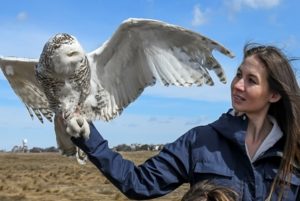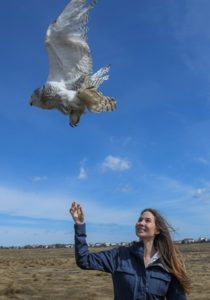By Christine Galeone, Contributing Writer

Shrewsbury – Winters in the Arctic tundra are much more harsh than New England ones. So, it’s not surprising that, during the season, many of its snowy owls leave their natural habitat to find comfort in this part of the country. But some find danger, instead.
Such was the case for one snowy owl that recently spent 57 days at a clinic after being accidentally poisoned. Unlike some others, this bird’s story has a happy ending. And Jessica Zorge, a Shrewsbury resident who’s a program assistant at Tufts Wildlife Clinic at Cummings Veterinary Medical Center at Tufts University, was thrilled to be part of it.
Taraneh Pettinato, the associate director of public relations at Cummings School of Veterinary Medicine, said the school was also thrilled with the bird’s rehabilitation.
“One of the key aspects of our mission at Tufts Wildlife Clinic is to provide top veterinary care to our wildlife patients with the goal of returning them to their natural habitats in the wild,” said Pettinato. “Our committed and caring veterinarians and staff work tirelessly toward this mission, and while it’s not always possible, we are so happy that this snowy owl was able to soar to these great heights!”
But when the owl arrived at the clinic on Feb. 10, it wasn’t clear if soaring would be in its future. Zorge, who has worked at the clinic for five years and volunteered there before becoming an employee, knows how difficult it is for raptors to recover from the effects of poison.
“Separate from but related to my work at Tufts, I actually have my state and federal rehabilitation permits and specialize in rehabilitating birds of prey in my spare time,” said Zorge, but she explained that veterinarians at the clinic “provided treatment and rehabilitation for this snowy owl.”
Zorge recalled that the bird was bleeding and was diagnosed with rodenticide toxicosis – which results from exposure to an anticoagulant rodenticide. It’s a common threat to raptors, because people don’t realize that by using these rodent poisons, they’re frequently poisoning birds that feed upon rodents. Maureen Murray, DVM, DABVP, the assistant director at Tufts Wildlife Clinic said that preventing rodents from entering homes is the best solution.
Murray oversaw the rehabilitation. She said that the bird’s condition was treated with vitamin K, which acts as an antidote to the poison and helps the bird recover.
“The snowy owl’s clotting was checked regularly to ensure it was returning to normal,” she said. “It moved through a series of different sized enclosures as it recovered, graduating to larger enclosures as its prognosis improved. It was eventually placed in a large flight barn that is over 100 feet in length where it could condition…”
Then, the bird was tagged with a federal band provided by the Massachusetts Audubon Society and was cleared to be released. And on a recent spring day, Zorge shared the ending to the raptor’s recovery story with her daughter, who accompanied her on the release.
“When a patient is ready to be released, it’s a great feeling knowing they can return to the wild,” said Zorge, who noted that the clinic’s staff goes “above and beyond” to help them. “I felt honored to see the restored strength and power of this snowy owl as it flew away.”



















